中考重点单词短语+用法归类+易混淆词辨析
中考英语常用易混淆单词词组的区别用法详解
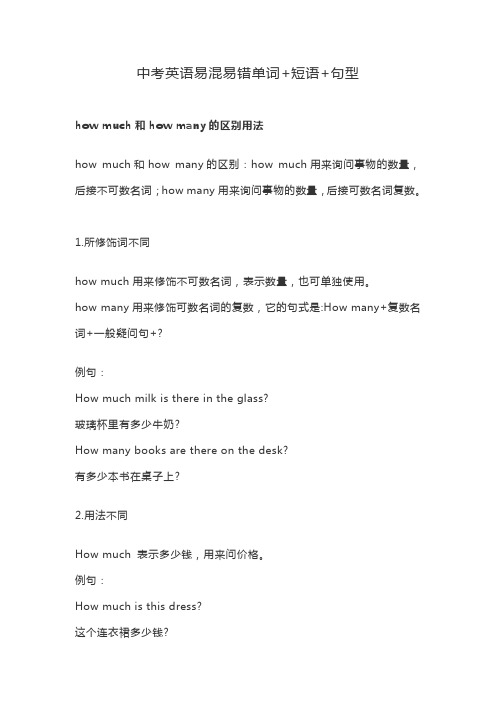
中考英语易混易错单词+短语+句型how much和how many的区别用法how much和how many的区别:how much用来询问事物的数量,后接不可数名词;how many用来询问事物的数量,后接可数名词复数。
1.所修饰词不同how much用来修饰不可数名词,表示数量,也可单独使用。
how many用来修饰可数名词的复数,它的句式是:How many+复数名词+一般疑问句+?例句:How much milk is there in the glass?玻璃杯里有多少牛奶?How many books are there on the desk?有多少本书在桌子上?2.用法不同How much 表示多少钱,用来问价格。
例句:How much is this dress?这个连衣裙多少钱?How many 表示多少,用来问数量。
例句:How many apples do you have?你有多少苹果?in和on的区别用法当我们表示某些东西被其他东西所包围时使用“in”这个词。
而“on”用于描述物体被放置在其他物体上方或外部的情况。
in可表时间,表地点,表手段、方法、材料。
on表示时间、地点、方位等。
1.意思不同in:prep.在... 里;在... 地方;在... 期间on:prep.在... 之上2.用法不同in:in着重一段时间的过程,常用于重复动作或延续动作。
in表示从现在时间算起推移到将来的一段时间之后,一般与将来时态连用。
例句:He is a layman in economics.他对经济学一窍不通。
on:表示“在物体的表面上”,只能用on的表达方式有on the next morning,on the following。
例句:The spider is walking on the ceiling.蜘蛛在天花板上爬行。
3.侧重点不同in:表示“在其中”。
on:表示“在表面”。
初中英语易错易混词汇和短语辨析(三)

初中英语易错易混词汇和短语辨析(三)1. can/be able to(1)can表示“本能”或能够,有一般时和过去时,后接动词原形一起构成谓语。
She can sing and dance.她能唱会跳。
(2)be able to后接动词原形,表示“能够”多指一个人经过后天的努力从而获取的一种“能力”,适用于各种时态。
I will be able to get a driver license a in a few weeks.几个星期之后我将会有驾照。
2. catch a cold/have a cold般情况下,这两个短语都表示“得了感冒,患了感冒”,但有所侧重(1)catch a cold强调动作I caught a cold yesterday.我昨天感冒了。
(2)have a cold强调状态I had a cold these days.这几天我感冒了。
3.die/dead/dying/death(1)die是终止性动词,不用于被动语态。
The little match girl died on the morning of the new year.卖火柴的小女孩在新年的早上死了。
(2)dead是形容词,表状态,可以与表示延续的时间状语连用。
On the morning of the new year,the little match girl was lying against the wall, dead!在新年的早上,卖火柴的小女孩靠墙躺着,死了!(3)death是名词。
When he knew the death of his wife ,he got mad.当他知道他妻子的死后,他疯了。
(4)dying意为”即将死亡的”,是形容词。
The dog is dying.这只狗快死了。
初中常见的die短语: die from/of..因……而死Many people died of hunger in African.在非洲,许多人死于饥饿。
初中英语中考常考易混词组辨析(共16组)
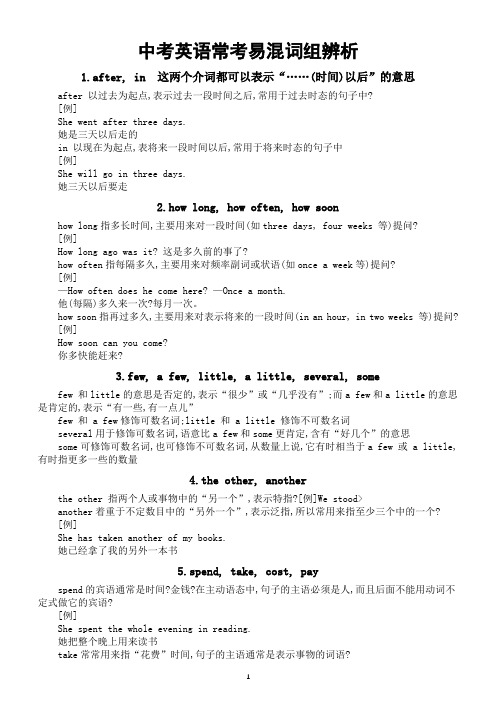
中考英语常考易混词组辨析1.after, in 这两个介词都可以表示“……(时间)以后”的意思after 以过去为起点,表示过去一段时间之后,常用于过去时态的句子中?[例]She went after three days.她是三天以后走的in 以现在为起点,表将来一段时间以后,常用于将来时态的句子中[例]She will go in three days.她三天以后要走2.how long, how often, how soonhow long指多长时间,主要用来对一段时间(如three days, four weeks 等)提问?[例]How long ago was it? 这是多久前的事了?how often指每隔多久,主要用来对频率副词或状语(如once a week等)提问?[例]—How often does he come here? —Once a month.他(每隔)多久来一次?每月一次。
how soon指再过多久,主要用来对表示将来的一段时间(in an hour, in two weeks 等)提问?[例]How soon can you come?你多快能赶来?3.few, a few, little, a little, several, somefew 和little的意思是否定的,表示“很少”或“几乎没有”;而a few和a little的意思是肯定的,表示“有一些,有一点儿”few 和 a few修饰可数名词;little 和 a little 修饰不可数名词several用于修饰可数名词,语意比a few和some更肯定,含有“好几个”的意思some可修饰可数名词,也可修饰不可数名词,从数量上说,它有时相当于a few 或 a little,有时指更多一些的数量4.the other, anotherthe other 指两个人或事物中的“另一个”,表示特指?[例]We stood>another着重于不定数目中的“另外一个”,表示泛指,所以常用来指至少三个中的一个?[例]She has taken another of my books.她已经拿了我的另外一本书5.spend, take, cost, payspend的宾语通常是时间?金钱?在主动语态中,句子的主语必须是人,而且后面不能用动词不定式做它的宾语?[例]She spent the whole evening in reading.她把整个晚上用来读书take常常用来指“花费”时间,句子的主语通常是表示事物的词语?How long will this job take you?你做这项工作要花多长时间?cost 指花费时间?金钱或力气等,只能用表示事物的词做主语,并且不能用于被动语态?[例]How much does the jacket cost?这件夹克多少钱?pay 主要指主语(某人)买某物(或为某事)付多少钱(给某人)?[例]I pay for my rooms by month.我按月支付租金6.among, betweenbetween 的意思是“在……中间,在……之间”,一般指在两者之间?[例]There is a table between two windows.在两扇窗户之间有一张桌子。
中考英语词汇辨析常考知识点是什么
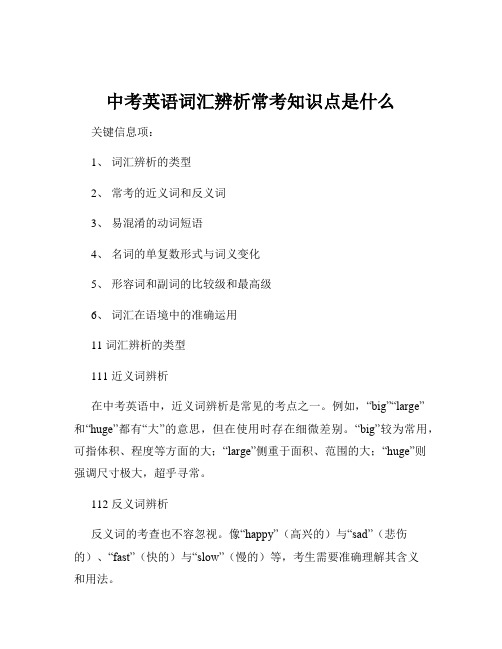
中考英语词汇辨析常考知识点是什么关键信息项:1、词汇辨析的类型2、常考的近义词和反义词3、易混淆的动词短语4、名词的单复数形式与词义变化5、形容词和副词的比较级和最高级6、词汇在语境中的准确运用11 词汇辨析的类型111 近义词辨析在中考英语中,近义词辨析是常见的考点之一。
例如,“big”“large”和“huge”都有“大”的意思,但在使用时存在细微差别。
“big”较为常用,可指体积、程度等方面的大;“large”侧重于面积、范围的大;“huge”则强调尺寸极大,超乎寻常。
112 反义词辨析反义词的考查也不容忽视。
像“happy”(高兴的)与“sad”(悲伤的)、“fast”(快的)与“slow”(慢的)等,考生需要准确理解其含义和用法。
113 形似词辨析一些词汇在拼写和发音上相似,但词义完全不同。
如“quite”(相当)和“quiet”(安静的),“accept”(接受)和“except”(除之外)。
12 常考的近义词和反义词121 常见的近义词“look”“see”“watch”都与“看”有关,但“look”强调看的动作,“see”侧重于看的结果,“watch”则常指观看活动、比赛等。
“spend”“cost”“take”“pay”都有“花费”之意,“spend”主语是人,“cost”主语是物,“take”通常用于“it takes sb some time to do sth”句型,“pay”常与“for”搭配。
122 常见的反义词“good”与“bad”、“right”与“wrong”、“many”与“few”、“much”与“little”等反义词在中考中经常出现,需要考生清晰掌握其用法和区别。
13 易混淆的动词短语131 由“put”构成的动词短语“put on”(穿上)、“put off”(推迟)、“put up”(张贴;举起)、“put away”(收拾好)等,这些短语的含义和用法各不相同。
2024中考备考英语重难点01 易混名词辨析(解析版)
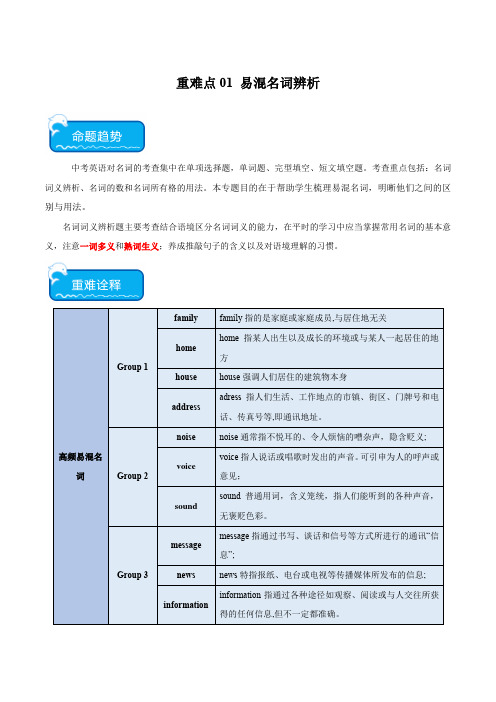
重难点01 易混名词辨析中考英语对名词的考查集中在单项选择题,单词题、完型填空、短文填空题。
考查重点包括:名词词义辨析、名词的数和名词所有格的用法。
本专题目的在于帮助学生梳理易混名词,明晰他们之间的区别与用法。
名词词义辨析题主要考查结合语境区分名词词义的能力,在平时的学习中应当掌握常用名词的基本意义,注意一词多义和熟词生义;养成推敲句子的含义以及对语境理解的习惯。
(2023中考真题建议用时:15分钟)1.(2023·辽宁鞍山·中考真题)—Why does Mary get good grades each time?—I think that’s because she puts most of her ________ into her schoolwork.A.energy B.practice C.exercise D.process2.(2023·内蒙古·中考真题)—The model plane is wonderful! How did you make it?—It’s easy. Follow the ________ and you can do it, too.A.discussion B.education C.conditions D.instructions3.(2023·江苏淮安·中考真题)As a student, you should keep a ________ between your schoolwork and yourhobbies.A.diary B.record C.secret D.balance4.(2023·湖北襄阳·中考真题)—Mr. Fan runs at least half an hour every day.—What a good ________! No wonder he looks healthy.A.habit B.question C.article D.prediction5.(2023·湖北黄石·中考真题)—Could you tell me the ________ of making such tasty dumplings?—Well, I just follow the steps on Tiktok.A.cost B.method C.time D.menu6.(2023·内蒙古呼和浩特·中考真题)High-speed trains are seen as one of the new Four Great ________ of China.A.Inventions B.Advantages C.Environments D.Technologies7.(2023·江苏常州·中考真题)After she was brought back to China, the sick giant panda Ya Ya received good ________ in her new home and got better.A.education B.communication C.entertainment D.treatment8.(2023·江苏南通·中考真题)—________ are easily made, but not easily kept.—That’s true. Once you make one, be sure to keep it.A.Speeches B.Decisions C.Promises D.Suggestions9.(2023·江苏镇江·中考真题)The main ________ of the cities along the Grand Canal (大运河) is history and culture.A.attraction B.pollution C.invention D.situation10.(2023·青海·中考真题)A taxi driver prevented (阻止) an _________ when he saw a car with serious problems travelling across Huangnan.A.accident B.interview C.advertisement11.(2023·山东青岛·中考真题)Before flying a plane, a ________ must take a lot of training.A.policeman B.musician C.nurse D.pilot12.(2023·湖北十堰·中考真题)—How did you fix up the machine, dad?—It’s easy. I just followed the ________.A.instructions B.inventions C.interviews D.influences13.(2023·江苏徐州·中考真题)Of all the ________, I love summer best.A.seasons B.subjects C.colours D.hobbies14.(2023·辽宁丹东·中考真题)Mary’s parents are interested in ________, so they often take her to concerts.A.sports B.music C.science D.movies15.(2023·江苏宿迁·中考真题)—The girl’s beautiful pronunciation caught our ________ in yesterday’s English speech competition.—Yes, many students couldn’t help cheering for her.A.condition B.attention C.invention D.position16.(2023·江苏泰州·中考真题)—Good news! The Chinese women table tennis team won a gold and a silver again.—Great! No matter who wins the medals, it is the ________ of our country.A.price B.pioneer C.pride D.pain17.(2023·黑龙江牡丹江·中考真题)Although our school life is a little busy, it is full of ________.A.pain B.sadness C.laughter18.(2023·四川遂宁·中考真题)—Which movie would you like to watch, Tracy?— Um…it’s hard to make a ________.A.survey B.choice C.call D.wish19.(2023·辽宁·中考真题)Thanks to the teacher’s help, I solved all the ________ easily.A.chances B.problems C.habits D.grades20.(2023·辽宁营口·中考真题)Scientists who are full of ________ always come up with new ideas and bring great changes to our life.A.instruction B.instrument C.invention D.introduction1.A【详解】句意:——为什么玛丽每次都取得好成绩?——我想那是因为她把大部分精力都放在功课上了。
中考英语重点易混淆短语总结精华(推荐)
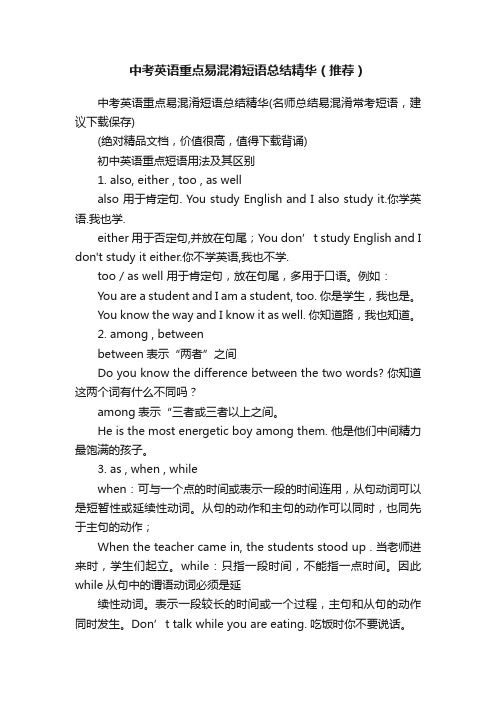
中考英语重点易混淆短语总结精华(推荐)中考英语重点易混淆短语总结精华(名师总结易混淆常考短语,建议下载保存)(绝对精品文档,价值很高,值得下载背诵)初中英语重点短语用法及其区别1. also, either , too , as wellalso 用于肯定句. You study English and I also study it.你学英语.我也学.either 用于否定句,并放在句尾;You don’t study English and I don't study it either.你不学英语,我也不学.too / as well 用于肯定句,放在句尾,多用于口语。
例如:You are a student and I am a student, too. 你是学生,我也是。
You know the way and I know it as well. 你知道路,我也知道。
2. among , betweenbetween表示“两者”之间Do you know the difference between the two words? 你知道这两个词有什么不同吗?among表示“三者或三者以上之间。
He is the most energetic boy among them. 他是他们中间精力最饱满的孩子。
3. as , when , whilewhen:可与一个点的时间或表示一段的时间连用,从句动词可以是短暂性或延续性动词。
从句的动作和主句的动作可以同时,也同先于主句的动作;When the teacher came in, the students stood up . 当老师进来时,学生们起立。
while:只指一段时间,不能指一点时间。
因此while从句中的谓语动词必须是延续性动词。
表示一段较长的时间或一个过程,主句和从句的动作同时发生。
Don’t talk while you are eating. 吃饭时你不要说话。
2024年中考20组必考英语易混词辨析

初中必考20组必考英语易混词辨析——易混词辨析——1、accomplish vs. achieveaccomplish (v.): 完成某项任务。
例子: She accomplished her homework. (她完成了作业。
)achieve (v.): 实现目标。
例子: He achieved his goal. (他实现了他的目标。
)2、advice vs. adviseadvice (n.): 建议。
例子: I need your advice. (我需要你的建议。
)advise (v.): 提供建议。
例子: I advise you to study. (我建议你学习。
)3、allow vs. permitallow (v.): 允许,通常口语化。
例子: My parents allow me to go out. (我的父母允许我出去。
)permit (v.): 允许,通常正式。
例子: The school permits it. (学校允许这样做。
)4、bored vs. boringbored (adj.): 感到无聊的。
例子: I feel bored in class. (我在课堂上感到无聊。
)boring (adj.): 令人无聊的。
例子: The movie was boring. (这部电影很无聊。
)5、careful vs. cautiouscareful (adj.): 小心的。
例子: Be careful with that glass. (小心那只玻璃杯。
)cautious (adj.): 小心翼翼的,避免风险。
例子: He is cautious with money. (他在处理钱时很小心。
)6、common vs. ordinarycommon (adj.): 普遍的。
例子: It is common to use phones. (使用手机是很常见的。
中考英语78个易混易错单词、短语、句型
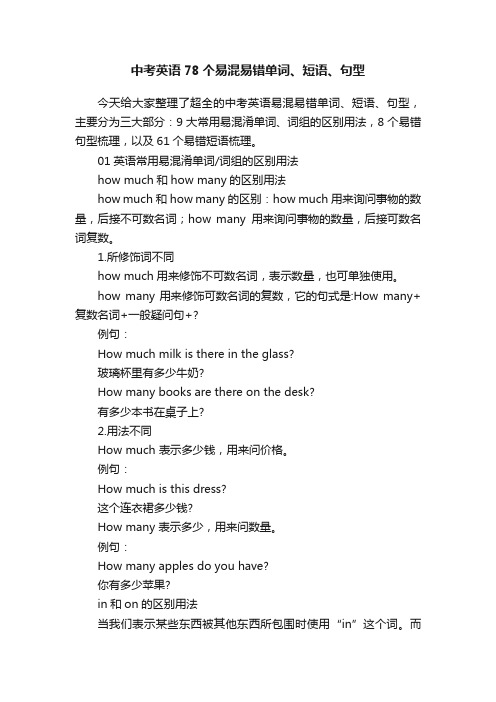
中考英语78个易混易错单词、短语、句型今天给大家整理了超全的中考英语易混易错单词、短语、句型,主要分为三大部分:9大常用易混淆单词、词组的区别用法,8个易错句型梳理,以及61个易错短语梳理。
01英语常用易混淆单词/词组的区别用法how much和how many的区别用法how much和how many的区别:how much用来询问事物的数量,后接不可数名词;how many用来询问事物的数量,后接可数名词复数。
1.所修饰词不同how much用来修饰不可数名词,表示数量,也可单独使用。
how many用来修饰可数名词的复数,它的句式是:How many+复数名词+一般疑问句+?例句:How much milk is there in the glass?玻璃杯里有多少牛奶?How many books are there on the desk?有多少本书在桌子上?2.用法不同How much 表示多少钱,用来问价格。
例句:How much is this dress?这个连衣裙多少钱?How many 表示多少,用来问数量。
例句:How many apples do you have?你有多少苹果?in和on的区别用法当我们表示某些东西被其他东西所包围时使用“in”这个词。
而“on”用于描述物体被放置在其他物体上方或外部的情况。
in可表时间,表地点,表手段、方法、材料。
on表示时间、地点、方位等。
1.意思不同in:prep.在 ... 里;在 ... 地方;在 ... 期间on:prep.在 ... 之上2.用法不同in:in着重一段时间的过程,常用于重复动作或延续动作。
in表示从现在时间算起推移到将来的一段时间之后,一般与将来时态连用。
例句:He is a layman in economics.他对经济学一窍不通。
on:表示“在物体的表面上”,只能用on的表达方式有on the next morning,on the following。
中考英语易错易混知识点

中考英语易错易混知识点中考英语中有一些易错易混的知识点,掌握了这些知识点可以帮助我们避免错误,提高成绩。
以下是一些常见的易错易混的知识点。
1.情态动词的用法情态动词包括can, could, may, might, must, shall, should, will, would等。
它们用来表示说话人的推测、意愿、能力、可能性等。
比如,can表示能力,may表示可能性等。
但是在考试中容易混淆使用这些情态动词。
我们应该根据特定的语境来选择正确的情态动词。
2.常见的词汇辨析中考英语中常有一些词汇辨析的题目,比如:weather和climate, city和town, fast和quick等。
我们要根据具体的语境来选择正确的词汇。
3.时态的使用英语中有很多时态,包括一般现在时,一般过去时,一般将来时等。
在考试中,我们需要根据具体的语境来选择正确的时态。
特别需要注意的是过去时和现在完成时的区别。
4.冠词的使用冠词分为定冠词(the)和不定冠词(a/an)。
在考试中,我们需要注意名词前是否需要用冠词,并根据具体的语境选择正确的冠词。
特别需要注意的是使用a/an时要根据名词的发音,以元音音素开头的名词用an,以辅音音素开头的名词用a。
5.单复数的区分英语中的名词有单数和复数形式。
在考试中,我们需要注意名词是单数还是复数,并根据具体的语境选择正确的形式。
需要特别注意的是一些不规则名词的复数形式。
6.非谓语动词的用法英语的非谓语动词包括不定式、动名词和分词。
在考试中,我们需要根据特定的语境来选择正确的非谓语动词形式。
比如,动名词作主语、宾语或表语,分词作定语或状语等。
7.介词的使用介词在句子中起连接作用。
在考试中,我们需要根据特定的语境来选择正确的介词。
有些介词在含义上非常相近,比如in, on和at,我们需要根据具体的语境来选择正确的介词。
8.连词的使用连词用来连接词、短语、从句等,在考试中我们需要根据特定的语境来选择正确的连词。
中考英语之易混淆词汇知识点辨析
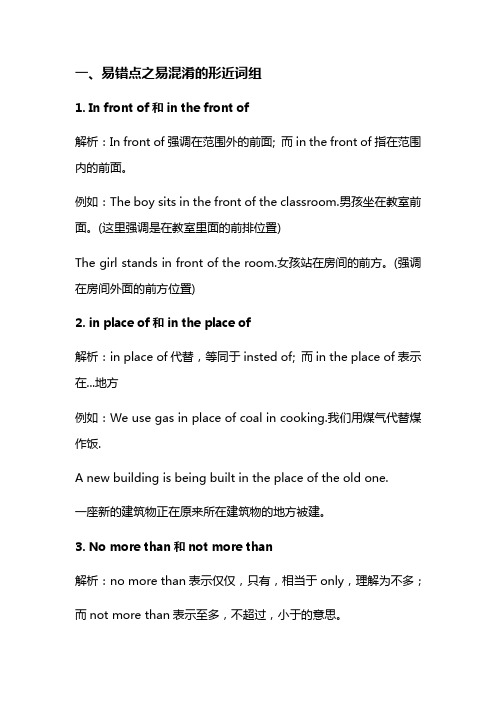
一、易错点之易混淆的形近词组1.In front of和in the front of解析:In front of强调在范围外的前面; 而in the front of指在范围内的前面。
例如:The boy sits in the front of the classroom.男孩坐在教室前面。
(这里强调是在教室里面的前排位置)The girl stands in front of the room.女孩站在房间的前方。
(强调在房间外面的前方位置)2.in place of和in the place of解析:in place of代替,等同于insted of; 而in the place of表示在...地方例如:We use gas in place of coal in cooking.我们用煤气代替煤作饭.A new building is being built in the place of the old one.一座新的建筑物正在原来所在建筑物的地方被建。
3.No more than和not more than解析:no more than表示仅仅,只有,相当于only,理解为不多;而not more than表示至多,不超过,小于的意思。
例如:He is no more than an ordinary English teacher. 他只不过是个普通的英文老师。
He has not more than three children. 他最多3 个孩子(有或许还不到三个)4.On earth和on the earth解析:两者都有在地上,在地球上的意思,但on earth还有到底,究竟的意思;On the earth只是单纯的表示在地上,在地球上例如:where on earth did you spring from?你究竟从哪里冒出来的?What if there was no lead on the earth at all?如果地球上根本就没有铅这种物质怎么办?5.At all和after all解析:at all表示根本,全然的意思,常用短语not at all表示一点也不;after all表示到底,毕竟的意思例如:I don't know him at all. 我根本不认识他。
中考常考(重点)易混淆短语辨析汇总(完整版)

中考常考(重点)短语辨析汇总(完整版)1.how long多长时间how soon多久以后how far多远how many多少how much多少;多少钱how often多久一次how old多大2.talk with… 与……交谈talk about… 谈论关于……talk to… 与……交谈talk back回嘴talk over商议talk to oneself自言自语3.think of… 考虑……;认为……think about… 思考……think back回想think up想出,想到think over仔细考虑;认真思考4.turn up调高;出现,露面turn down调低;拒绝turn on打开turn off关闭turn left向左转turn right向右转5.put up搭建,张贴put down放下;镇压put off推迟;拖延put on穿上;增加put up with… 忍受……put aside把……放在一边put away收拾好,放好6.show up出现,露面show off炫耀on show展示7.in need处于需要中,需要in person亲自in danger陷入危险in common共同之处in trouble陷入困境;陷入麻烦in fact事实上in style时髦地in general 总体上8.turn up调高;出现pick up捡起;(无意中)学到;(开车)接某人take up开始从事;占give up放弃make up编造;化妆go up上涨put up搭建,张贴clean up大扫除grow up长大;成长cheer up振奋起来wake up醒过来,弄醒set up建立line up排队stand up站起来stay up熬夜pick up捡起,拾起;无意中学习到;接听look up向上看;查阅cut up切碎mix up混合9.take after… 长得像……take off起飞;脱下;(事业)走红take in吸收;吸入take out取出,拿出take part 拆开take notice注意到take the place of… 取代……take up开始;从事;接纳;占据;继续做take on承担;呈现take over接受;接管;借用;接办take down记下;取下take place发生;进行;举行take a look看一下take a walk散步take away带走,拿走,取走take care of… 照顾……;注意……;抚养……take charge掌管,负责10.g ive up放弃give in投降give away捐赠give off发出give out分发give back归还11.l ook after… 照顾……look for… 寻找……look at… 看一看……look up向上看;查阅look into… 调查……look like… 看起来像……look down向下看,俯视look out当心look through… 浏览……look forward to… 盼望……look up to… 钦佩……;仰慕……look back… 回头看……; 回顾……look down upon (on)… 看不起……,轻视……look on… 旁观……,观望……12.t ake down记下break down突然终止,中断fall down摔倒cut down砍下put down放下;镇压go down下降;下跌calm down平静下来13.k now about… 了解……;知道……talk about… 谈论关于……worry about… 担心……;挂念……care about… 关心……write about… 写关于……argue about… 争论……hear about/of… 听说……14.c lean off清理;清算get off下车take off起飞;脱下;(事业)走红put off推迟,拖延turn off关闭kick off踢掉;开除shut off关闭;暂停go off(闹铃等)响了15.g et up起床get off下车get on上车get along/on with… 与……相处16.t hrow out扔掉go out外出,出去cut out切断come out出来;出版look out当心give out分发clear out清理try out尝试lay out排版;放置work out解决carry out实施,执行put out扑灭find out弄清楚hang out 闲逛check out退房eat out 外出吃饭pull out推出;摆脱17.p lay with… 与……一起玩part with… 放弃……;交出……;卖掉……begin with… 开始……talk with… 与……交谈start with… 开始……deal with… 处理……;应付……agree with… 同意……argue with… 与……争论18.h ang up挂断;结束hang back退缩;拖拉hang off迟疑hang out闲逛19.b low away吹走;驱散put away放好;收拾好throw away扔掉give away赠送20.l ook for… 寻找……pay for… 支付……ask for… 寻求……;索要……21.c ome true实现come over过来come up被提出come in进来come up with… 提出……;想出……come across… 偶遇……come from… 来自……22.c ome from… 来自……hear from… 收到……的来信be from… 来自……23.set out出发;开始;陈述set about sth./doing sth.着手做某事set off动身,出发; 燃放(鞭炮等),使……爆炸或发出响声set up竖起来,支起来;建立,成立set aside 放在一边,搁置;存蓄,留下24.play jokes/a joke on… 戏弄……play a trick/tricks on sb.捉弄某人make fun of… 捉弄……;取笑……make fool of… 愚弄……;戏弄……laugh at… 嘲笑……25.g o out出去go away离开go over复习go off(闹铃)响起26.a bove all最重要;首先after all毕竟;别忘了at all丝毫;根本first of all首先in all总共27.s hut off关闭; 停止运转shut up闭嘴28.a t first首先at least至少at most至多at once立刻,马上at that time在那时at the same time同时29.get in the way of… 挡……的路,妨碍in a way (= in one way/in some ways)从某一角度看;在某种程度上in the way挡路on one’s way (to…) 在去……的路上in no way决不(置于句首,句子要倒装)by the way 顺便问no way没门30.h ave a chance有机会have a cold感冒have the flu患流感have a point有道理,讲得通have to do with… 与……有关31.w ithout doubt 毫无疑问;的确There is no doubt that… 毫无疑问……32.b e proud of… 为……感到自豪take pride in… 为……感到自豪33.c ompare…with…把……与……进行比较compare …to…把……比作……34.b y the way顺便问一下by accident= by chance偶然地by mistake错误地one by one一个接一个step by step一步一步地little by little逐渐地by the time到……为止by oneself独自地shake sb. by the hand和某人握手35.b e good at… 擅长于,通常指在“技能,技巧,学科”等方面擅长be good with… 好,灵巧的,与……相处得好be good to… 对……友好,相当于be friendly to或是be kind tobe good for… 对……有好处36.b e strict with sb.对某人严格要求be strict in sth.在某方面严格要求。
中考英语常用易混淆单词词组的区别用法详解
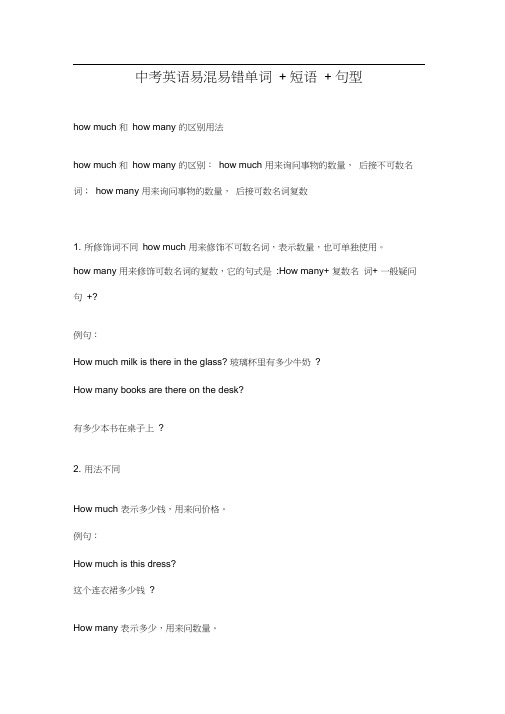
中考英语易混易错单词+ 短语+ 句型how much 和how many 的区别用法how much 和how many 的区别:how much 用来询问事物的数量,后接不可数名词;how many 用来询问事物的数量,后接可数名词复数1. 所修饰词不同how much 用来修饰不可数名词,表示数量,也可单独使用。
how many 用来修饰可数名词的复数,它的句式是:How many+ 复数名词+ 一般疑问句+?例句:How much milk is there in the glass? 玻璃杯里有多少牛奶?How many books are there on the desk?有多少本书在桌子上?2. 用法不同How much 表示多少钱,用来问价格。
例句:How much is this dress?这个连衣裙多少钱?How many 表示多少,用来问数量。
例句:How many apples do you have?你有多少苹果?in 和on 的区别用法当我们表示某些东西被其他东西所包围时使用“ in ”这个词。
而“ on 用于描述物体被放置在其他物体上方或外部的情况。
in 可表时间,表地点,表手段、方法、材料。
on 表示时间、地点、方位等。
1. 意思不同in :prep. 在... 里;在... 地方;在... 期间on :prep. 在... 之上2. 用法不同in :in 着重一段时间的过程,常用于重复动作或延续动作。
in 表示从现在时间算起推移到将来的一段时间之后,一般与将来时态连用。
例句:He is a layman in economics.他对经济学一窍不通on :表示“在物体的表面上”,只能用on 的表达方式有on the next morning ,on the following 。
例句:The spider is walking on the ceiling.蜘蛛在天花板上爬行。
九年级常考的易混淆词汇,短语及句型辨析汇总(三)

九年级常考的易混淆词汇,短语及句型辨析汇总(三)16. be known/famous for/as/ to…的辨析:(1) be known / famous as… 意为“作为……而出名”,as后接表示职业、身份等的名词;(2) be known / famous for… 意为“因……而著名”,介词for后接出名的原因;(3) be known to… 意为“为……所知/ 熟知”,介词to后接人。
e.g. He is known to the police for his previous criminal record.He is known as a fair judge and respected by many people.She is famous for her hard work,and we all admire her.Suzhou is known for its beautiful gardens.As we know, Yao Ming is known as a basketball player.17. such as,that is,namely与for example的辨析:(1) such as 用来列举事物时,一般列举同类人或事物中的几个例子且所列举事物的数量不能等于它前面所提到的总和,such as后面不打“,”;(2)that is 或者namely用来列举事物时,一般列举同类人或事物中的几个例子且所列举事物的数量等于它前面所提到的总和,that is 或者namely后面通常要打“,”;(3) for example用来举例说明某一论点或情况,一般只举同类人或物中的“一个”为例,作插入语,可位于句首,句中或句尾,通常与所给的例子用逗号隔开,其后的例子可以是从句。
e.g. I’d like to keep a pet, for example, a dog.My daughter studies four subjects in school, that is , Chinese, math, English and P.E.We all study foreign languages, such as English, French or Japanese and so on.I like animals, such as dogs, bears and pandas.He has ever been to many countries, for example, Australia.18. because与because of…的辨析:(1)意思都为“因为,由于”;(2) because为连词,后接句子;(3) because为介词短语,后接非句子,相当于due to,owing to等。
九年级常考的易混淆词汇,短语及句型辨析汇总(一)
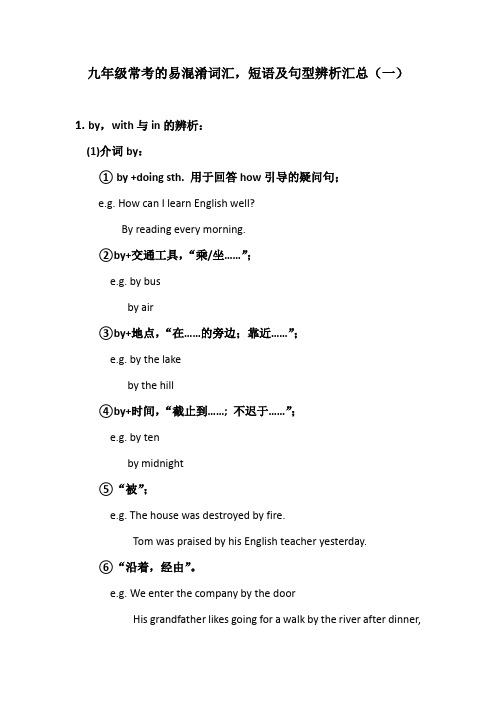
九年级常考的易混淆词汇,短语及句型辨析汇总(一)1. by,with与in的辨析:(1)介词by:① by +doing sth. 用于回答how引导的疑问句;e.g. How can I learn English well?By reading every morning.②by+交通工具,“乘/坐……”;e.g. by busby air③by+地点,“在……的旁边;靠近……”;e.g. by the lakeby the hill④by+时间,“截止到……; 不迟于……”;e.g. by tenby midnight⑤“被”;e.g. The house was destroyed by fire.Tom was praised by his English teacher yesterday.⑥“沿着,经由”。
e.g. We enter the company by the doorHis grandfather likes going for a walk by the river after dinner,⑦常用的短语:by the way 顺便问一下by accident= by chance 偶然地by mistake 错误地one by one 一个接一个step by step 一步一步地little by little 逐渐地by the time 到……为止by oneself 独自地shake sb. by the hand 和某人握手(2)with的用法:表示用某种工具。
with +工具;with+人体部位。
e.g. We like to write with a pen.We see with our eyes.(3) in的用法:通常与“语言、衣着、声音、书写材料”等名称连用。
e.g. in English用英语in ink用墨水speak in a loud voice大声地讲in red 穿红色的衣服2. so/ such…that… 的用法辨析:(1)“如此……以至于……”,引导的结果状语从句句型有:①so +形容词/副词+that 从句;②so+形容词+ a / an +单数名词+that 从句;③such+ a / an + (形容词)+单数名词+that 从句;④such +(形容词)+复数名词/ 不可数名词+ that从句。
【精品】中考易混词汇辨析总结.doc
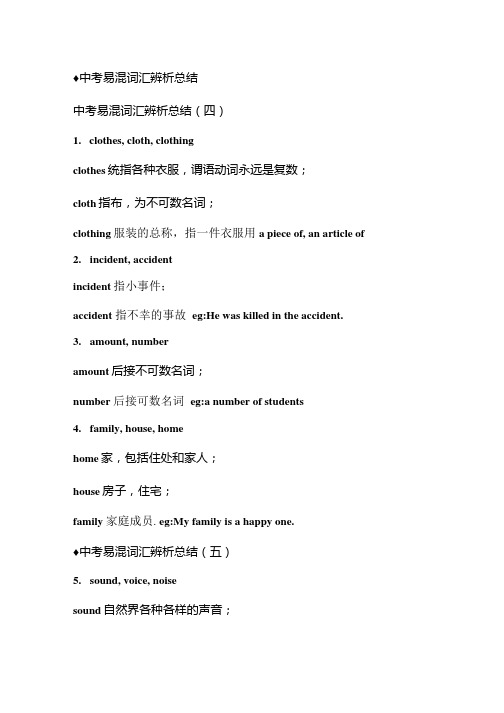
♦中考易混词汇辨析总结中考易混词汇辨析总结(四)1.clothes, cloth, clothingclothes统指各种衣服,谓语动词永远是复数;cloth指布,为不可数名词;clothing服装的总称,指一件衣服用a piece of, an article of 2.incident, accidentincident指小事件;accident 指不幸的事故eg:He was killed in the accident.3.amount, numberamount后接不可数名词;number 后接可数名词eg:a number of students4.family, house, homehome家,包括住处和家人;house房子,住宅;family 家庭成员.eg:My family is a happy one.♦中考易混词汇辨析总结(五)5.sound, voice, noisesound自然界各种各样的声音;voice人的嗓音;noise 噪音eg:I hate the loud noise outside.6.photo, picture, drawingphoto用照相机拍摄的照片;picture可指相片,图片,电影片;drawing 画的画eg:Let*s go and see a good picture.7.vocabulary, wordvocabulary词汇,一个人拥有的单词量;word 具体的单词eg:He has a large vocabulary.8.population, peoplepopulation 人口,人数;people 具体的人eg:China has a large population.♦中考易混词汇辨析总结(六)9.weather, climateweather 一天内具体的天气状况;climate 长期的气候状况eg:The climate here is not good for you.10.road, street, path, wayroad具体的公路,马路;eg:take this roadstreet 街道;eg:in the streetpath小路,小径;way 道路, 途径eg:show me the way to the museum.11.course, subjectcourse课程(可包括多门科目);eg:a summer coursesubject科目(具体的学科)12.custom, habitcustom传统风俗,习俗,也可指生活习惯,后接to do;habit 生活习惯,习惯成自然,后接of doing. eg:I*ve got the habit of drinking a lot.♦中考易混词汇辨析总结(七)13.cause, reasoncause指造成某一事实或现象的直接原因,后接of sth./doing sth; reason用来解释某种现象或结果的理由,后接for sth./doing sth. eg:the reason for being late14.exercise, exercises, practiceexercise运动,锻炼(不可数);exercises练习(可数);practice (反复做的)练习eg:Practice makes perfect.15.class, lesson作"课"解时,两者可以替换.指课文用lesson;指班级或全体学生用class, eg:lesson 6; class 516.speech, talk, lecturespeech指在公共场所所做的经过准备的较正式的演说;talk日常生活中的一般的谈话,讲话;lecture 学术性的演讲,讲课eg:a series of lecture on... ♦中考易混词汇辨析总结(八)17.officer, officialofficer部队的军官;official 政府官员eg:an army officer18.work, job二词均指工作。
九年级常考的易混淆词汇,短语及句型辨析汇总(五)

九年级常考的易混淆词汇,短语及句型辨析汇总(五)13. manage和try的辨析:(1) manage to do sth.“(设法)做成某事”,含有“成功,办成”的意思;(2) try to do sth.“试图做某事”,但不知道能否做成。
e.g. In spite of bad weather, we managed to get to the airport in time.He tried to make his daughter believe what he said,but he failed.14. join,join in,take part in与attend的辨析:(1) join指加入某个党派,团体组织等,成为其中一员,意为“参军,入党,入团”。
join the Army/the Party/the League参军;入党;入团join sb. in (doing) sth.和某人一起做某事(2) join in多指参加小规模的活动,如“游戏,比赛”,口语中常用。
(3) take part in指参加会议或群众性活动,着重说明主语参加该项活动并在活动中发挥作用。
take an active part in 积极参加……(4) attend正式用语,指参加会议,婚礼,葬礼,典礼,去上课,上学,听报告等。
e.g. Will you join us in the picnic?Join in the basketball game.We’ll take part in the sports meeting /club.I attended a night school.15.含有all的常见短语辨析:(1) above all“最重要;首先”(2) after all“毕竟;别忘了”(3) at all“丝毫;根本”(4) first of all“首先”(5) in all“总共”e.g. Above all, just have fun!If you want to succeed, above all, you should believe in yourself.So, you see, I was right after all.You decided to come after all.16. worthwhile,worth与worthy的辨析:(1) worthwhile为adj.,意为“值得的”,常用于以下句型:It is worthwhile to/doing sth. 或sth. is worthwhile to do/doing.(2) worth意为“值得”,常用于以下句型:sth. is worth sth. /doing syh.(3) worthy意为“值得的”,常用于以下句型:sth. be worthy of sth./being done.或sth. be worthy to be done.e.g. The film is worthy of being seen.= The film is worthy to be seen.It is worthwhile visiting/to visit the Great Wall.The museum is worth a visit.= The museum is worth visiting.The new museum is really worth a visit.I don’t think this movie is worth watching.17.常见的使役动词用法辨析:(1) let sb. do sth.“让某人做某事”;(2) make sb. do sth.“使某人做某事”;be made to do sth.“被使去做某事”;(3) have sb. do sth.“使某人做某事”;have sb. doing sth.“使某人一直做某事”;have sth. done“使某事被做”。
- 1、下载文档前请自行甄别文档内容的完整性,平台不提供额外的编辑、内容补充、找答案等附加服务。
- 2、"仅部分预览"的文档,不可在线预览部分如存在完整性等问题,可反馈申请退款(可完整预览的文档不适用该条件!)。
- 3、如文档侵犯您的权益,请联系客服反馈,我们会尽快为您处理(人工客服工作时间:9:00-18:30)。
2017中考冲刺(重点单词短语+用法归类+易混淆词辨析)1. 冠词,a an 重点记忆an apple\orange\Englishbook\ice-cream\interesting\engineer\eye\umbrella\hour\honest\honor\elephant\ apartment\international\unusuala useful\ university\usual\ uniform\European2. . cost / take / spend / pay 花费花费时间做某事:It takes sb some time to do sth . = sb spend some time (in)doing sth .= sb spend some time on sth .某人花钱买某物:sb spend some money on sth . = sb pay some money for sth . =sth cost sb . some money .※ spend 和pay 主语都是人,cost 主语是物。
※ spent 还可以指“度过”→ How did you spend your weekend ?⑴The sweater ________ me 90 yuan . = I _______ 90 yuan for the sweater .=I_____ 90 yuan on the sweater .⑵He spent lots of money ________ the mobile phone .It ________ her 20 minutes to go home every day . = He ________ 20 minutes ________ home every day .3 .thanks for为…而感谢⑴______ inviting me to your birthday party .thanks to 多亏/由于⑵______ your help .I got good grades4.因为、由于:because( 连词) +从句:( 表示原因)because of(介词短语)+ 名词(短语)= thanks to⑴I didn’t go to school ______ I had a headache .⑵He was late for class ______ the bad weather .⑶He can’t come _____ he is ill .⑷Many people have a cold _____ the cold weather .because和so不能同时连用.5 .How often对频率提问(多久一次)→回答用表示频率的副词或短语How long对一段时间提问(多久)→回答用表示一段时间的状语How soon对将来时间提问(多久)→回答用in+时间段How far询问多长距离(多长)⑴- ______ have you been collecting the kites ? -For ten years .⑵- ______ do you go shopping ? -Sometimes.⑶ - ______ will your father come back ? - In two years .⑷- _____ do you exercise ? - Once a week .⑸- _____ is it from your home to school ? - About ten miles .⑹- _____ are you staying there ? - Two weeks .6. 乘交通工具:take a / the +交通工具在句中作谓语by+交通工具= on a 交通工具在句中作方式状语交通工具有:train/bus/car/taxi/boat/subway/plane…⑴ He takes a bus to bank .= He goes to bank by bus . = He goes to bank on a bus .⑵ I walk to school . = I go to school ______ .※骑自行车、马或驴用ride :ride one’s bike / ride a horse / ride a donkey in one’s car7.到达… reach + 地点get to + 地点reach = get toarrive + in + 大地点arrive + at + 小地点⑴ He reached London yesterday . = He ______ to London yesterday . = He ______in London yesterday .⑵ She arrived ______ the bus station just now . ⑶ You should ______ ( get ) home on time .※当get to和arrive at /in后接地点副词时,都不加介词。
如:get home get there 省略to8.. win (赢得)接a game、war 、a match、a prizebeat ( 打败、战胜)接运动员、球队、对手等。
⑴ Which team ______ the football match ?⑵ Wang Hao ______ Ma Lin and ______ the champion of the Men’s Singles .9.. 借borrow sth . from sb = borrow sb . sth 向某人借某物→ borrow借入lend sth . to sb = lend sb . sth把某物借给某人→ lend 借出keep延续性动词,与一段时间连用。
⑴ Can you lend me your bike ? = Can you ______ your bike ______ me ?⑵ You can borrow some money ____ your brother . = You can borrow your brother ____ ____.⑶ - How long can I ______ the book ?- You can _____ it for two weeks .10. too many太多—修饰可数名词复数→ I have too many rules in my house .too much太多—修饰不可数名词→ Maybe you have too much yin .much too 太—后跟形容词或副词原级→ This coat is much too expensive .⑴ Eating _____ ______ is bad for your health .⑵ It’s ______ ______cold today . You’d better not go out .⑶ There are ______ ______ students in the hallways . It’s dangerous .11. 属于:belong to + 名词/ 人称代词宾格(属于)be + 名词所有格/ 名词性物主代词(是)⑴ It must ______ Ning’s .= It must _________ Ning .⑵ The pencil must be ______ (my) . = The pencil must belong to ______ (my) .⑶ This ball ______ to me .= This ball is ______ .12.the number of + 名词复数(…的数量)作主语,谓语用单数。
a number of + 名词复数(许多、一些)= many⑴ The number of students in our class______ 80 .⑵ ______ number of students are in Helin Middle School .13.. for + 一段时间since + 时间点/过去时的句子⑴ We have been studying English ______ three years .⑵ He has been staying here ______ he was five years old . .⑶ We haven’t seen each other ______ ten years ago .※for和since 可以相互转换。
如:Jenny has been collecting coins for several years .= Jenny has been collecting coins since several years ______ .14.否定祈使句Don’t + v.No + v.ing / n.⑴ Don’t smoke here . = ______ ______ here . ⑵ Don’t take photos. = ______ ______ .15.sometimes不时;有时(是一般现在时的标志词)→Sometimes I go to school by bus . some times几次(此时time是可数名词,意为“次数”)→He has been to Shanghai some times .sometime某个时间(表示在过去或将来的某个时候)→ I saw him sometime last year .some time一段时间(此时time是不可数名词)→ He will stay here for some time .⑴ We are going to have a party ________ next week .⑵ _______ the boy is late for school .⑶ He spent _________ in cutting hair .So he missed the early bus .⑷ Li Jun has been to Bird’s Nest _________ .16. 穿戴:“wear + 衣服/鞋帽/眼镜等(强调状态)→Our teacher often wears a pair of glasses .put on +衣服/鞋帽/眼镜等(强调动作)→Kate puts on her hat and goes out .be in + 颜色/服饰(强调状态)→The girl in red is my sister .dress + 人/反身代词(给某人穿) →She dresses her daughter everymorning .⑴ You’d better ______ your coat . ⑵ She was _______ a flower in her hair .⑶The boy ______ white is my friend . ⑷He is too young to ______ himself .⑸ Miss Li often _____ the white sports shoes .※dress当表示状态时常用be dressed in + 衣物(穿着…颜色的衣服)→He is dressed in a black coat .他常穿着黑色的外套。
